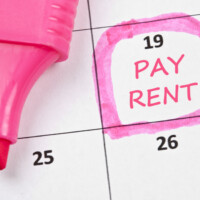
A poll of 1,986 adults by StepChange Debt Charity revealed this was higher than the fifth of mortgage holders relying on credit to make payments.
In the last 12 months, 27 per cent of private renters have dipped into their savings to pay their rent in September, up from the 20 per cent of people who said the same when asked in May.
Nearly a quarter, 23 per cent, have had to ration utilities such as electricity, heating or water in order to pay their rent. Again, this was up from a fifth in May.
According to 51 per cent of the renters polled by StepChange, it has been hard to keep up with bills and credit commitments in the last few months. This compares to a third of a wider population.
Some 17 per cent of renters are also in ‘problem debt’, which is when a person is unable to pay their debts or other household bills and relies on either their overdraft, credit or a loan to keep up with commitments. StepChange’s research found this compared to eight per cent of the general population.
This research comes as figures from the Office for National Statistics showed that private rental prices in the UK rose by 5.5 per cent in the year to August, higher than the 5.3 per cent growth recorded in July.
StepChange’s poll found 56 per cent of private renters had seen their rent go up in the last 12 months. Many do not feel comfortable approaching their landlord, however, with just 19 per cent willing to speak with them if they were struggling to pay rent. This compares to 54 per cent of mortgage holders who would speak to their lender about payment difficulties.
Policy reform
As part of the Renters (Reform) Bill, StepChange is asking for rent arrears under Ground 8 of the Housing Act to be a discretionary reason for eviction, rather than mandatory. The charity also wants courts to assess a tenant’s circumstances when they fall behind on payments and step in where landlords have failed to support them.
Richard Lane, director of external affairs at StepChange Debt Charity, said: “Amid a crisis of housing affordability that continues to intensify, tenants in the private rented sector remain among the groups with the least protection from problem debt and destitution.
“Our figures show that private renters are more likely than mortgage holders to be struggling with bills and credit commitments, and more likely to rely on credit to pay their rent, yet they feel unable to reach out to their landlord for help if they’re in difficulty. For a private renter experiencing financial insecurity, there is little to protect them from eviction if they fall into rent arrears.”
He added: “While we hope the government will follow through with its commitment to strengthen protections for private rental sector (PRS) tenants through the Renters (Reform) Bill, especially through the end to Section 21 evictions, these proposed reforms alone will fail to prevent the most financially vulnerable tenants from losing their homes.
“Having mandatory protections in the private rented sector that mirror what already exists for social housing tenants and mortgagers would create a fairer and more sustainable system for private renters, which is especially vital as the cost of living crisis rages on.
“Housing law and policy are years behind the reality of a private rented sector where landlords are poorly placed to deal with the needs of struggling vulnerable tenants. Alongside legal reforms, the government must ensure that effective support is in place to help people stay in their homes without the constant fear of debt or eviction.”